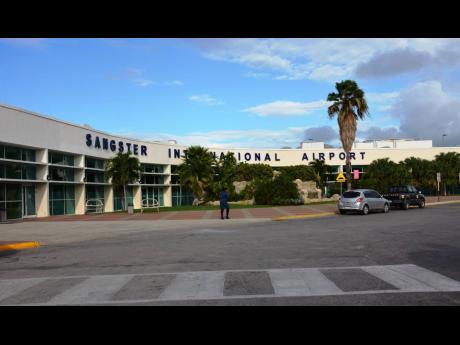Sangster projects up to 75% of pre-COVID arrivals next year
WESTERN BUREAU:
Despite the cloud of uncertainty looming over international travel, MBJ Airports CEO Shane Munroe is projecting returns of between 50 and 75 per cent of the 2019 visitor-arrival figures by 2021.
In 2019, MBJ Airports, which operates Sangster International, served 4.7 million visitors and was expected to surpass that figure in 2020, but the COVID-19 pandemic brought the travel industry to its knees.
“So next year, we feel that travel could be, perhaps, 50 to 75 per cent of 2019, but what that projection will mean going forward, a lot depends really on how it plays out with the health crisis,” Munroe told attendees at a Private Sector Organisation of Jamaica online forum on Wednesday.
Acknowledging the difficulty in predicting exactly when there would be a full revival of the travel sector, Munroe said he expects that the decline would be “V-shaped”, which, in economic terms, means that it would be characterised by a quick and sustained recovery, after what has been, so far, a sharp economic decline.
He said that the demand for global travel at present is predicated on the types of quarantine measures and lockdowns in destinations.
Jamaica’s recovery, he said, would depend on “triggers” such as the proposed COVID-19 vaccine and “direct government decisions” relating to the other strategies to make visitors feel confident that they can safely take a leisure trip to the island.
As a result of the United States, Canada, and the United Kingdom being Jamaica’s largest source markets, he said the island ought to be prepared to have bilateral arrangements with all three about meeting each other’s health requirements.
Citing a recent McKinsey and Company study, which revealed that there is latent demand for travel, Munroe recommended other strategies, along with rapid tests, that the Government could undertake to incentivise passengers to travel as many are willing to fly if they are convinced it is safe to do so.
Paramount among the criteria for recovery, according to Munroe, is for efforts to be made to address the absence of global standards, which is a key pillar of the aviation industry.
“Aviation works based on global standards. For some reason, it is absent in this crisis right now, but even after 9/11, what brought back travel was global standards that worked regardless of the state, regardless of the country. And so those consistent measures restored confidence for the travelling public, who expected a certain level of safety, and that’s what’s needed now,” he argued.
Tourism Minister Edmund Bartlett recently revealed that Jamaica Cares – the ground-breaking mandatory, travel protection and emergency services insurance programme – had received very positive feedback from global tourism stakeholders, who want to replicate it across the world.
Led by the Global Tourism Resilience and Crisis Management Centre, the programme covers COVID-19 testing for symptomatic travellers, quarantine/isolation in a medical facility or in sanctioned quarantine facilities, and evacuation, if necessary.
It will also provide visitors with the cost of medical care, evacuations, field rescue, case management, and patient advocacy in all circumstances up to and including natural disasters.

